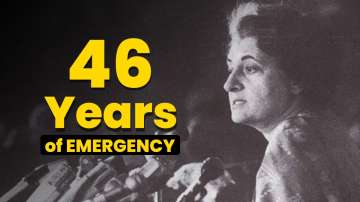46 years of EMERGENCY: What India experienced in its darkest hour
Officially issued by President Fakhruddin Ali Ahmed under Article 352 of the Constitution due to the prevailing "internal disturbance", the Emergency was in effect from June 25, 1975, until its withdrawal on March 21, 1977.

On this day in 1975, emergency was declared in India, for a 21-month period by the then Prime Minister Indira Gandhi. On this day, Independent India experienced it's darkest hour of the history.
Officially issued by President Fakhruddin Ali Ahmed under Article 352 of the Constitution due to the prevailing "internal disturbance", the Emergency was in effect from June 25, 1975, until its withdrawal on March 21, 1977.
The order vested upon the Prime Minister the authority to rule by decree, allowing elections to be suspended and Freedom of Press was curtailed. Several human rights violations were reported in that time, including a forced mass-sterlisation campaign spearheaded by Indira's son Sanjay Gandhi.
The final decision to impose an Emergency was proposed by Indira Gandhi, agreed upon by the President, and thereafter ratified by the Cabinet and the Parliament (from July to August 1975), based on the rationale that there were imminent internal and external threats to the Indian state. The Emergency is considered to be one of the most controversial periods of independent India's history.
Union Home Minister Amit Shah on Friday remembered June 25 of 1975 and said that the Emergency was imposed in the nation to quell the voices against one family and termed it as a dark chapter in the history of independent India.
Taking to Twitter, Shah said: "Emergency imposed to quell the voices against one family is a dark chapter in the history of independent India. Salute to the sacrifice of all the countrymen who fought relentlessly for the protection of the Constitution and democracy of the country while suffering the brutal tortures of the ruthless rule for 21 months."
Shah further said that on this day in 1975, in the selfishness and arrogance of power Congress killed the world's largest democracy by imposing an Emergency on the country.
"On this day in 1975, Congress killed the world's largest democracy by imposing emergency on the country in the selfishness and arrogance of power. Innumerable Satyagrahis were imprisoned overnight and the press was locked. Taking away the fundamental rights of the citizens, made the Parliament and the court a mute spectator," he added.
46 years of Emergency in India
In March–April 1974, a student agitation by the Bihar Chatra Sangharsh Samiti received the support of Gandhian socialist Jayaprakash Narayan, referred to as JP, against the Bihar government. In April 1974, in Patna, JP called for "total revolution," asking students, peasants, and labour unions to non-violently transform Indian society.
Raj Narain, who had been defeated in the 1971 parliamentary election by Indira Gandhi, lodged cases of election fraud and use of state machinery for election purposes against her in the Allahabad High Court. Shanti Bhushan fought the case for Narain. Indira Gandhi was also cross-examined in the High Court which was the first such instance for an Indian Prime Minister.
On 12 June 1975, Justice Jagmohanlal Sinha of the Allahabad High Court found the prime minister guilty on the charge of misuse of government machinery for her election campaign. The court declared her election null and void and unseated her from her seat in the Lok Sabha. The court also banned her from contesting any election for an additional six years. Serious charges such as bribing voters and election malpractices were dropped and former PM was held responsible for misusing government machinery.
Indira Gandhi challenged the High Court's decision in the Supreme Court. Justice V. R. Krishna Iyer, on 24 June 1975, upheld the High Court judgement and ordered all privileges Gandhi received as an MP be stopped, and that she be debarred from voting. However, she was allowed to continue as Prime Minister pending the resolution of her appeal.
Siddhartha Shankar Ray, the Chief Minister of West Bengal, proposed to the prime minister to impose an "internal emergency". He drafted a letter for the President to issue the proclamation based on information Indira had received that "there is an imminent danger to the security of India being threatened by internal disturbances".
Later, President Fakhruddin Ali Ahmed declared a state of internal emergency upon the prime minister's advice on the night of 25 June 1975, just a few minutes before the clock struck midnight.
Invoking article 352 of the Indian Constitution, Indira Gandhi granted herself extraordinary powers and launched a massive crackdown on civil liberties and political opposition.
Vijayaraje Scindia, Jayaprakash Narayan, Raj Narain, Morarji Desai, Charan Singh, Jivatram Kripalani, Atal Bihari Vajpayee, Lal Krishna Advani, Arun Jaitley, Satyendra Narayan Sinha, Gayatri Devi, the dowager queen of Jaipur, and other protest leaders were immediately arrested.
Organisations like the Rashtriya Swayamsevak Sangh (RSS) and Jamaat-e-Islami, along with some political parties, were banned. Strong resistance was seen during the time of the emergency from the RSS and the Sikh community.
On 18 January 1977, Gandhi called fresh elections for March and released all political prisoners, though the Emergency officially ended on 23 March 1977. The opposition Janata movement's campaign warned Indians that the elections might be their last chance to choose between "democracy and dictatorship."
Historically a Congress stronghold, voters in Uttar Pradesh, turned against Gandhi and her party failed to win a single seat in the state. Also, Congress hit an all-time low in West Bengal.
Opponents emphasised the issues of corruption in Congress and appealed to a deep desire by the voters for fresh leadership.
ALSO READ: Congress infighting: Rahul Gandhi to meet Punjab MLAs today
ALSO READ: Robert Vadra's vehicle challaned for dangerous driving in Delhi